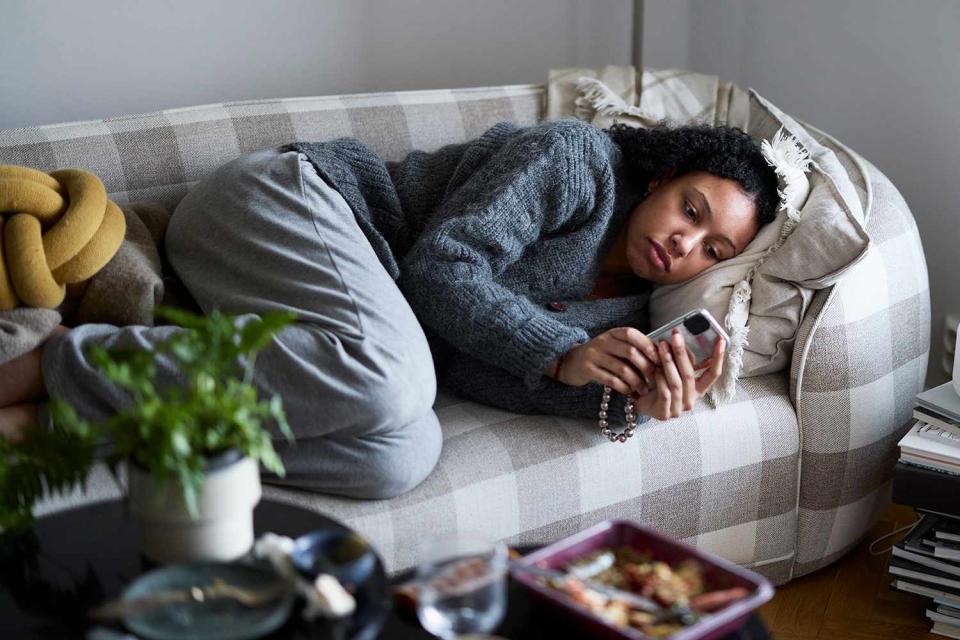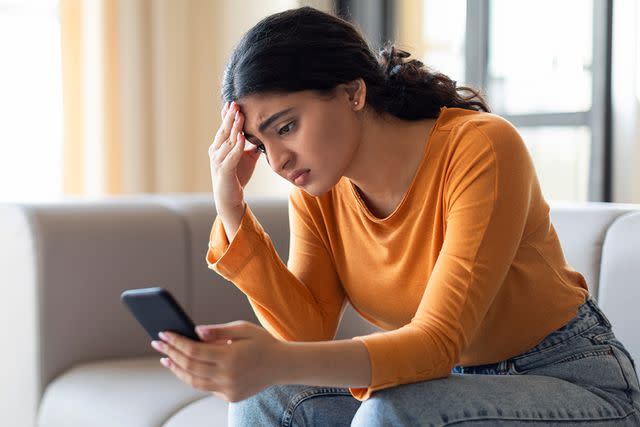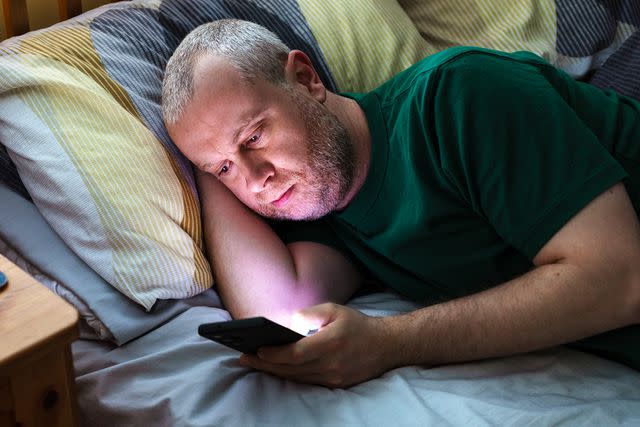Is TikTok a Good Platform to Learn About Anxiety? Here’s What Experts Think
Mental health TikTok is incredibly popular — but in some cases, may be causing more problems than it's curing. What to know about how to consume the content

Johner Images/Getty
TikTok is home to many things, from innovative recipes to organizing hacks and beauty tutorials. It’s also become a space for open conversations around mental health. Search anxiety or depression on TikTok, and you’ll find thousands of videos — from experts and everyday people alike — on symptoms, coping mechanisms, and more.
Destigmatizing conversations around mental health has been a beneficial use of social media, and has helped countless people prioritize and understand their own. However, experts are warning that consuming too much mental health content, especially from creators who aren't actually experts in the field, can be dangerous.
Why TikTok Can Cause Anxiety
“The 20-30 second nature of TikTok videos doesn't allow for a full exploration of the complexities of mental health and the impact that mental health has on one’s overall functioning,” says Kevin Belcastro, LMFT, the clinical director at The Mental Health Center of San Diego. “Instead, these sound bites of information provide individuals with sensationalized or emotionally charged bits of information, which some individuals using TikTok take as being absolute truths about mental health.”
Part of this problem is the algorithm. TikTok prioritizes more sensationalist content designed to grab your attention quickly; that can lead to a higher rate of interaction with upsetting, anxiety-inducing content like horror and death.
But your "for you page" can be a minefield even if you're consuming relatively benign content. For example, if someone interested in mental health watches "a video of someone discussing their anxiety, you'll see another one shortly after, and another and another,” Dr. Allegra Nevins, a licensed therapist at Williamsburg Therapy Group, tells PEOPLE. Repeated viewing of this kind of content can lead to a bigger issue: self-diagnoses.

Prostock-Studio/Getty
What to Know About Self-Diagnosis
There’s been an uptick in self-diagnosis from social media, with one in four Americans having self-diagnosed themselves with a mental health disorder based on information from social media apps, according to a 2023 survey from mental health publisher Tebra.
The survey also reported that TikTok is one of the largest social apps responsible for self-diagnoses and mental health misinformation. Gen Z, in particular, is vulnerable to TikTok’s inaccurate diagnostics because it’s their app of choice.
This is especially dangerous because Zillennials suffer from mental health disorders at higher rates than previous generations and thus, need more accurate and helpful information.
It’s not that you can’t use TikTok for mental health information. There’s nothing wrong with watching your favorite content creator talk about their attention-deficit/hyperactivity disorder (ADHD) and relating to their experience.
Related: Let's Talk About It
However, it’s important to have discernment and realize that identifying with your favorite influencer’s experience doesn’t mean you have ADHD or a mental health disorder, says Dr. Scott Lyons, a licensed holistic psychologist and creator of the trauma learning platform, The Embody Lab. Personal narratives are just that — personal.
"No mental health condition, even anxiety, is universal. It has many different shapes, colors, and manifestations and even theories behind it,” Dr. Lyons tells PEOPLE. “And so it's really important to identify and [think], ‘Oh, they're sharing this — and let it be their story.’”
And, remember that not every emotion or feeling is a symptom of something deeper. When self-diagnosing yourself, you run the risk of pathologizing normal feelings, Dr. Nevins explains: “We have emotions for a reason, and they are not inherently bad. If we look at fear, for example, its function is to protect us from danger and serve as a source of motivation. If we completely rid ourselves of fear, what would happen if we were to encounter a bear in the woods?”

coldsnowstorm/Getty
The Best Way to Consume Mental Health Content
That said, you don’t have to stop watching mental health TikToks. The app is a great resource for having vulnerable conversations about mental health and gaining more insight into what causes anxiety and depression, as well as coping mechanisms that have been successful for others. But while its accessibility is great, it’s also a beacon for misinformation, and makes it very hard to determine who is qualified to offer their expertise.
So, keep in mind that a creator’s experience with anxiety or depression is their own, and be sure to watch videos from licensed professionals. Nevins recommends checking creators’ credentials and researching their background if you want to take their advice seriously. And if you believe you have a mental health issue worth treating, look for an in-person therapist to discuss it further; just be prepared to hear a diagnosis from them that might differ from the one you feel you're experiencing.
Still interested to learn more about mental health, but away from a platform that's designed more for algorithm than education? Try podcasts on the topic, such as “The Anxious Truth” or “Inside Mental Health.” Check out sites like Maybelline’s Brave Together, which offers resources for talking to friends about mental health, or Verywell Mind (a sibling site to PEOPLE). Or visit your local library for books by providers; some of our personal favorites include Maybe You Should Talk to Someone by therapist Lori Gottlieb and Unf#ck Your Brain by Dr. Faith Harper.
Related: 10 Things to Try for a Quick Mental Health Boost
Ultimately, the clock app is just one platform for mental health, and it's designed to engage you, not to treat you. Remember that next time you’re scrolling through your feed and watching an influencer chat about their anxiety.
If you or someone you know needs mental health help, text "STRENGTH" to the Crisis Text Line at 741-741 to be connected to a certified crisis counselor.
For more People news, make sure to sign up for our newsletter!
Read the original article on People.

